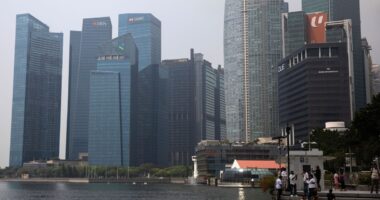
Italy blocked the export of AstraZeneca PLC’s Covid-19 vaccine to Australia, in a move coordinated with European Union authorities, reflecting mounting frustration in Europe with slow deliveries of vaccines.
The move was prompted by the persisting shortage of vaccines in Italy and the EU, delays in the supply of vaccines by AstraZeneca and the fact that Australia is considered a “nonvulnerable country” to Covid-19 under EU regulations, Italy’s Ministry of Foreign Affairs said.
The decision affects 250,700 doses, a number the ministry said was high compared with what has been delivered so far by AstraZeneca. The doses were bottled at a factory near Rome that is part of the company’s supply chain. AstraZeneca has delivered around 1.5 million doses to Italy, according to the government.
Representatives for AstraZeneca declined to comment on the decision.
The move by Italian Prime Minister Mario Draghi’s government in Rome is the first use of a new EU policy that allows controls to be imposed on the export of Covid-19 vaccines. The EU is struggling to meet public expectations of a large-scale vaccine rollout that would rein in Covid-19 contagion and allow the easing of onerous restrictions that have weighed on Europe’s daily life and economy for months.
EU authorities have come under criticism for a vaccine strategy that bet on procuring an array of different vaccines—some of which still aren’t approved or available—and has been slow in comparison with regulatory and procurement efforts in the U.K. and U.S.
The U.K.’s rapid vaccine rollout and accompanying drop in Covid-19 hospitalizations has heightened pressure on the EU. Some officials and member countries have blamed the drug companies, particularly AstraZeneca, for the holdups.
Blocking vaccine exports holds risks for the EU, if the precedent set by Italy spreads and other parts of the world retaliate. Europe’s vaccination plans depend partly on doses and ingredients made outside the continent.
The European Commission in late January adopted what it called a “transparency and authorization mechanism” to ensure that vaccine doses from companies with which the EU had already signed contracts weren’t being shipped outside the bloc.
The commission stressed that the measure, enacted initially through the end of this month, isn’t an export ban. Instead, EU countries established systems to authorize vaccine exports. Until the Italian decision, all 174 export requests across the bloc since Jan. 30 had been approved, EU officials said.
Decisions to approve or block exports are taken at the national level and cleared with EU authorities in Brussels, based on an analysis of data supplied by the vaccine producer. If a country determines that the company is exporting vaccines before meeting its contractual obligation in the EU, the exports can be blocked.
AstraZeneca had asked the Italian government for permission to export the 250,000 doses, in accordance with the policy. Rome declined and the European Commission, the EU’s executive arm, supported the Italian government’s decision, Italy’s Ministry of Foreign Affairs said.
During a videoconference with EU leaders last week, Mr. Draghi was among the most vocal in pushing for the EU to consider tightening its export-review system, including potentially blocking exports of vaccine ingredients. Senior EU officials said the commission is now reviewing its vaccine supply chain to identify potential risks for the bloc.
Italy’s step marks an escalation of tensions that erupted in January between European officials and AstraZeneca, after the Anglo-Swedish drugmaker said it would deliver tens of millions fewer doses than planned to the bloc in February and March.
AstraZeneca struggled to fix production shortfalls at a Belgian plant, leading to a war of words with the bloc. European officials accused the drugmaker of shortchanging Europe while favoring the U.K. AstraZeneca’s chief executive, Pascal Soriot, fired back, telling an Italian newspaper that the U.K. had committed to ordering months earlier, allowing production to increase. He said AstraZeneca wouldn’t divert doses from the U.K. but would work to bolster European supplies and catch up to its obligations.
Last week, amid concerns that shortages of AstraZeneca shots for the EU would continue for several more months, the company said it was working on plans with manufacturers in other parts of the world, including Asia, to bring doses to Europe.
The company said it still aimed to deliver 180 million doses to the EU in the second quarter. “Approximately half of the expected volume is due to come from the EU supply chain, while the remainder would come from its international supply network,” a company spokesman said at the time.
AstraZeneca has promised to deliver 3 billion doses globally this year, more than any other vaccine maker, and to do so without profiting. That ambitious task has gotten off to a rocky start.
Dr. Soriot last year said the company had created a complex global supply chain designed to manufacture doses close to where they would be used. One of the aims was to avoid any political hurdles in getting shipments from one part of the world to another. Such political obstacles, along with regulatory-approval and manufacturing delays, are proving to be difficult to surmount.
—Laurence Norman in Brussels contributed to this article.
Write to Giovanni Legorano at [email protected] and Jenny Strasburg at [email protected]
Copyright ©2020 Dow Jones & Company, Inc. All Rights Reserved. 87990cbe856818d5eddac44c7b1cdeb8









